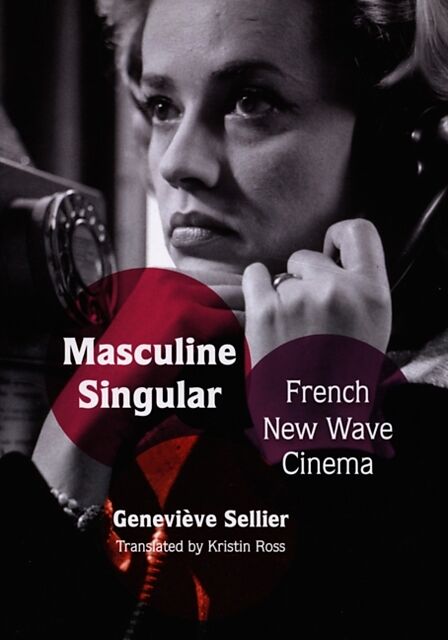Masculine Singular
Einband:
Kartonierter Einband
EAN:
9780822341925
Untertitel:
French New Wave Cinema
Genre:
Kunst
Autor:
Genevieve Sellier
Herausgeber:
Duke University Press
Anzahl Seiten:
280
Erscheinungsdatum:
25.03.2008
ISBN:
978-0-8223-4192-5
Informationen zum Autor Geneviève Sellier is Professor of Film Studies at the University of Caen. Her books include Jean Grémillon: Le cinéma est à vous and La Drôle de guerre des sexes du cinéma français, 19301956 (with Noël Burch). Kristin Ross is Professor of Comparative Literature at New York University. She is the author, most recently, of May '68 and Its Afterlives and Fast Cars, Clean Bodies: Decolonization and the Reordering of French Culture. Klappentext Masculine Singular is an original interpretation of French New Wave cinema by one of France's leading feminist film scholars. While most criticism of New Wave has concentrated on the filmmakers and their films, Geneviève Sellier focuses on the social and cultural turbulence of the cinema's formative years, from 1957 to 1962. The New Wave filmmakers were members of a young generation emerging on the French cultural scene, eager to acquire sexual and economic freedom. Almost all of them were men, and they "wrote" in the masculine first-person singular, often using male protagonists as stand-ins for themselves. In their films, they explored relations between men and women, and they expressed ambivalence about the new liberated woman. Sellier argues that gender relations and the construction of sexual identities were the primary subject of New Wave cinema. Sellier draws on sociological surveys, box office data, and popular magazines of the period, as well as analyses of representations in early New Wave films. She examines the development of the New Wave movement, its sociocultural and economic context, and the popular and critical reception of such well-known films as Jules et Jim and Hiroshima mon amour. In light of the filmmakers' focus on gender relations, Sellier reflects on the careers of New Wave's iconic female stars, including Jeanne Moreau and Brigitte Bardot. Sellier's thorough exploration of early New Wave cinema culminates in her contention that its principle legacy-the triumph of a certain kind of cinephilic discourse and of an "auteur theory" recognizing the director as artist-came at a steep price: creativity was reduced to a formalist game, and affirmation of New Wave cinema's modernity was accompanied by an association of creativity with masculinity. Zusammenfassung Presents an original interpretation of French New Wave cinema by one of France's leading feminist film scholars. This title argues that gender relations and the construction of sexual identities were the primary subject of New Wave cinema. Inhaltsverzeichnis Acknowledgments vii Introduction: The Aesthetic Doxa on the New Wave 1 1. A New Generation Marked by the Emergence of Women 11 2. Cinephilia in the 1950s 22 3. Auteur Cinema: An Affair of State 34 4. Contrasting Receptions 41 5. The Precursors 70 6. Between Romanticism and Modernism 95 7. Nostalgia for a Heroic Masculinity 128 8. The Women of the New Wave: Between Modern and Archaic 145 9. Jeanne Moreau: Star of the New Wave and Icon of Modernity 184 10. Brigitte Bardot and the New Wave: An Ambivalent Relationship 199 11. The Independent Filmmakers of the Left Bank: A "Feminist" Alternative 210 Conclusion: The New Wave's Legacy: "Auteur Cinema" 221 Appendix One: Box Office Results 225 Appendix Two: The Press 227 Notes 231 Bibliography 245 Index 253...
Autorentext
Geneviève Sellier is Professor of Film Studies at the University of Caen. Her books include Jean Grémillon: Le cinéma est à vous and La Drôle de guerre des sexes du cinéma français, 1930–1956 (with Noël Burch). Kristin Ross is Professor of Comparative Literature at New York University. She is the author, most recently, of May ’68 and Its Afterlives and Fast Cars, Clean Bodies: Decolonization and the Reordering of French Culture.
Klappentext
Masculine Singular is an original interpretation of French New Wave cinema by one of France's leading feminist film scholars. While most criticism of New Wave has concentrated on the filmmakers and their films, Geneviève Sellier focuses on the social and cultural turbulence of the cinema's formative years, from 1957 to 1962. The New Wave filmmakers were members of a young generation emerging on the French cultural scene, eager to acquire sexual and economic freedom. Almost all of them were men, and they "wrote" in the masculine first-person singular, often using male protagonists as stand-ins for themselves. In their films, they explored relations between men and women, and they expressed ambivalence about the new liberated woman.
Sellier argues that gender relations and the construction of sexual identities were the primary subject of New Wave cinema. Sellier draws on sociological surveys, box office data, and popular magazines of the period, as well as analyses of representations in early New Wave films. She examines the development of the New Wave movement, its sociocultural and economic context, and the popular and critical reception of such well-known films as Jules et Jim and Hiroshima mon amour. In light of the filmmakers' focus on gender relations, Sellier reflects on the careers of New Wave's iconic female stars, including Jeanne Moreau and Brigitte Bardot. Sellier's thorough exploration of early New Wave cinema culminates in her contention that its principle legacy-the triumph of a certain kind of cinephilic discourse and of an "auteur theory" recognizing the director as artist-came at a steep price: creativity was reduced to a formalist game, and affirmation of New Wave cinema's modernity was accompanied by an association of creativity with masculinity.
Zusammenfassung
Presents an original interpretation of French New Wave cinema by one of France's leading feminist film scholars. This title argues that gender relations and the construction of sexual identities were the primary subject of New Wave cinema.
Inhalt
Acknowledgments vii
Introduction: The Aesthetic Doxa on the New Wave 1
1. A New Generation Marked by the Emergence of Women 11
2. Cinephilia in the 1950s 22
3. Auteur Cinema: An Affair of State 34
4. Contrasting Receptions 41
5. The Precursors 70
6. Between Romanticism and Modernism 95
7. Nostalgia for a Heroic Masculinity 128
8. The Women of the New Wave: Between Modern and Archaic 145
9. Jeanne Moreau: Star of the New Wave and Icon of Modernity 184
10. Brigitte Bardot and the New Wave: An Ambivalent Relationship 199
11. The Independent Filmmakers of the Left Bank: A "Feminist" Alternative 210
Conclusion: The New Wave's Legacy: "Auteur Cinema" 221
Appendix One: Box Office Results 225
Appendix Two: The Press 227
Notes 231
Bibliography 245
Index 253

Leider konnten wir für diesen Artikel keine Preise ermitteln ...
billigbuch.ch sucht jetzt für Sie die besten Angebote ...
Die aktuellen Verkaufspreise von 6 Onlineshops werden in Realtime abgefragt.
Sie können das gewünschte Produkt anschliessend direkt beim Anbieter Ihrer Wahl bestellen.
Loading...
Die aktuellen Verkaufspreise von 6 Onlineshops werden in Realtime abgefragt.
Sie können das gewünschte Produkt anschliessend direkt beim Anbieter Ihrer Wahl bestellen.
| # | Onlineshop | Preis CHF | Versand CHF | Total CHF | ||
|---|---|---|---|---|---|---|
| 1 | Seller | 0.00 | 0.00 | 0.00 |
